Time Study: The Proven Method to Boost Productivity and Efficiency
In today’s highly competitive industrial landscape, a time study is one of the most effective techniques for improving productivity and operational efficiency.
A time study is a systematic method used to observe, record, and analyze the time taken to complete a specific task or operation under defined conditions. It plays a crucial role in time study in management, helping managers establish fair performance standards, optimize workflows, and eliminate unnecessary delays or bottlenecks.
For modern manufacturing and industrial operations, adopting a structured time study approach is more important than ever. It allows businesses to identify hidden inefficiencies, set realistic production targets, and balance workloads more effectively. By integrating time study in management practices, organizations can ensure that every process is measured, monitored, and continuously improved — ultimately driving down costs and increasing profitability.
At Sugoya India, we believe that a well-executed time study is the backbone of any successful productivity improvement initiative. Our expertise helps industries implement proven time study in management techniques to streamline operations, maximize resource utilization, & stay ahead in the competitive market. With our tailored solutions, businesses can transform the way they manage time, people, and processes for sustainable growth.
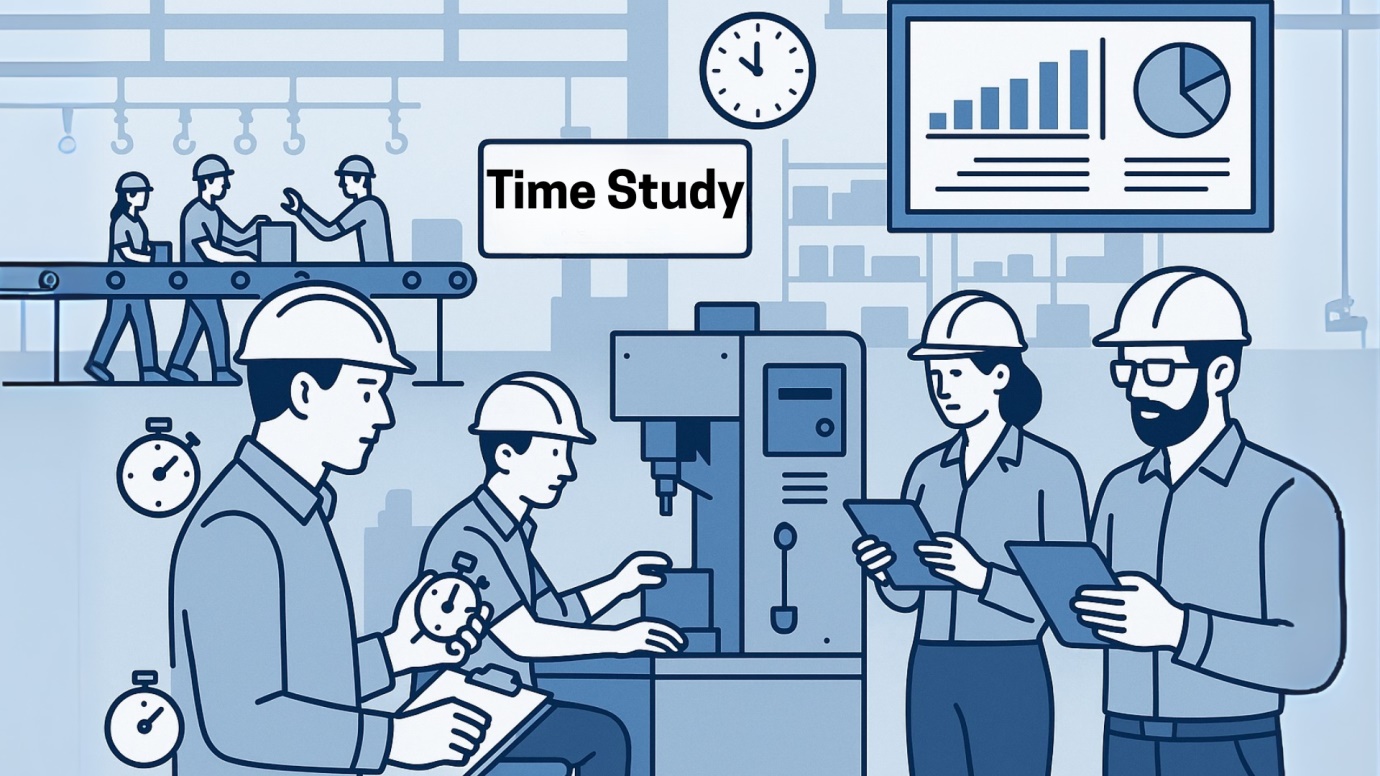
What is Time Study?
A time study is a tried-and-tested work measurement technique used to determine the time required for a trained worker to perform a specific task under standard working conditions. At its core, a time study provides managers and engineers with reliable data to plan, control, and improve production processes.
The concept of time study has its roots in the early 20th century, thanks to the pioneering work of Frederick Winslow Taylor — often regarded as the father of scientific management. Taylor’s innovative approach laid the foundation for what we now know as time study in industrial engineering, transforming how industries measure and manage work.
In today’s modern operations, the role of time study in industrial engineering remains as relevant as ever. It serves as a backbone for many productivity improvement strategies and is widely used across manufacturing, service, and other labor-intensive sectors.
Key goals of a time study include:
- Setting Standard Times: Establish accurate and fair time standards for tasks, ensuring that labor costs are predictable and achievable.
- Improving Workflow: Identify unnecessary motions, delays, or bottlenecks to design more efficient work processes.
- Reducing Inefficiencies: Pinpoint wasted effort and adopt best practices for optimal performance.
When applied correctly, a time study in management ensures that resources are allocated wisely, work is balanced evenly, and overall productivity reaches its fullest potential. It empowers managers to make data-driven decisions that benefit both employees and the organization as a whole.
At Sugoya India, we recognize that a well-executed time study is not just a technical exercise but a strategic tool that drives continuous improvement. By combining the principles of time study in industrial engineering with practical time study in management methods, businesses can unlock higher efficiency, better quality, and sustainable growth.
Why is Time Study Important?
In the fast-paced world of modern manufacturing and industrial operations, staying competitive means optimizing every process to the highest standard. This is where time study in production management plays a crucial role. By systematically analyzing how time is spent on each task, businesses gain the insights they need to work smarter and more efficiently.
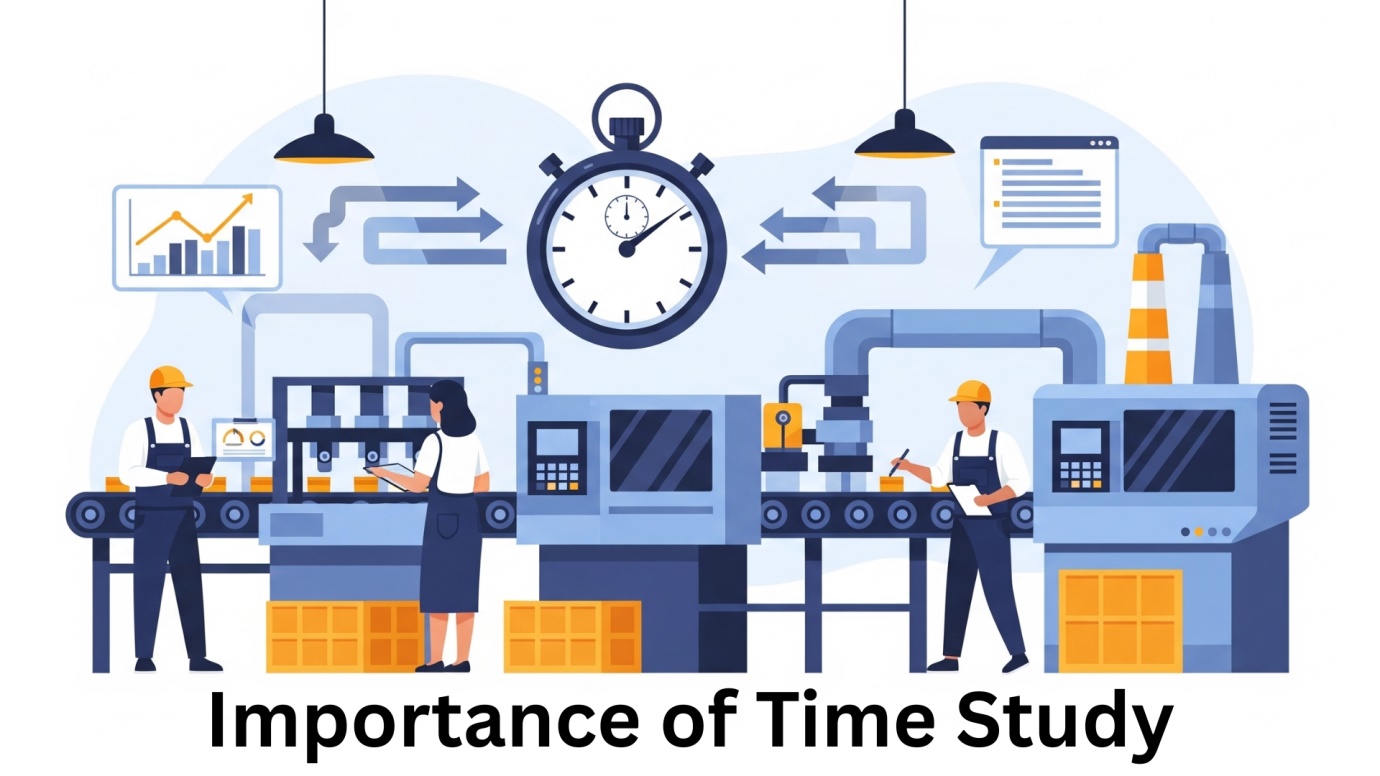
When implemented effectively, time studies manufacturing processes can deliver significant advantages:
- Improves Work Planning and Scheduling: A well-conducted time study in production management helps create realistic timelines for each operation. By knowing how long tasks genuinely take, managers can design more accurate production schedules, avoid delays, and balance workloads across shifts. This level of precision ensures that resources — whether machines, materials, or manpower — are always used optimally.
- Enables Fair Performance Evaluation: One of the key benefits of time studies manufacturing workflows is that they provide a fair and transparent basis for evaluating worker performance. Employees know exactly what is expected of them, which builds trust and motivation. Supervisors, in turn, have objective data to reward efficiency and identify areas for skill development.
- Helps in Accurate Labor Costing: A systematic time study in production management is vital for cost control. It allows organizations to calculate labor costs with confidence by setting reliable standard times for tasks. This helps in preparing competitive bids, pricing products correctly, and maximizing profit margins without compromising quality.
- Identifies Bottlenecks and Process Waste: Through thorough time management research, companies can spot hidden inefficiencies in their processes. Whether it’s unnecessary motion, excessive downtime, or repetitive tasks, these issues can be eliminated or redesigned to streamline operations. The result is a more productive, leaner workflow that boosts output and reduces operational costs.
By investing in professional time studies manufacturing operations, businesses gain a powerful tool for continuous improvement. At Sugoya India, we believe that strategic time management research combined with practical industry expertise empowers our clients to reach new levels of productivity and profitability.
How is a Time Study Conducted?
A well-structured time study is more than just observing workers with a stopwatch — it’s a scientific method rooted in time study in industrial engineering that helps organizations understand exactly how time is spent on every task. By following a systematic process, businesses can ensure their time study analysis is accurate, fair, and practical to implement in real-world conditions.
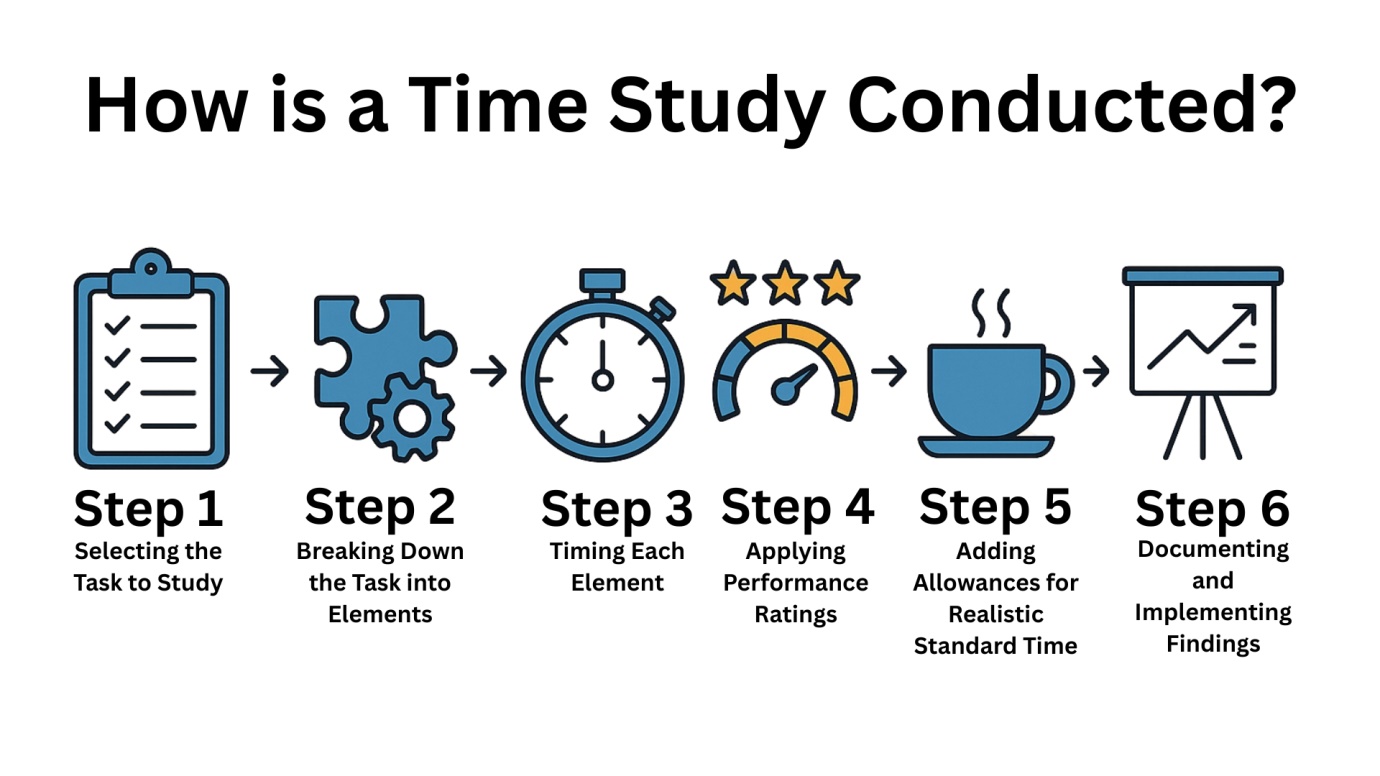
Below is a clear step-by-step guide to how a time study is typically conducted:
Step 1: Selecting the Task to Study
- The first step in a successful time study in production management is choosing the right task. It should be repetitive, measurable, and have a clear beginning and end. Selecting the right task ensures that the results of your time study analysis will be meaningful and provide actionable insights for your production process.
Step 2: Breaking Down the Task into Elements
- Next, break the task into smaller, easily observable work elements. This is a core principle in time study in industrial engineering. By analyzing each element separately, you can pinpoint where time is being used efficiently and where improvements can be made. This step forms the foundation for a detailed time study analysis.
Step 3: Timing Each Element
- Using a reliable timing method — whether a stopwatch, video recording, or specialized software — record the time taken to complete each element over several cycles. This part of the time study in management ensures that you capture realistic variations in work pace, which are then averaged for accuracy.
Step 4: Applying Performance Ratings
- Once you have your observed times, apply a performance rating to adjust for the worker’s speed relative to the standard or “normal” pace. This transforms raw observations into meaningful data that reflects expected performance levels — an essential part of any credible time study analysis.
Step 5: Adding Allowances for Realistic Standard Time
- No worker can operate at peak efficiency every minute. So, allowances are added for factors like fatigue, personal needs, and unavoidable delays. This step ensures that the final standard time is realistic and fair, aligning perfectly with the principles of time study in production management and time study in management.
Step 6: Documenting and Implementing Findings
- Finally, compile all your time study results into clear, actionable reports. Share these with supervisors and workers to standardize best practices. The goal is to use your time study in industrial engineering insights to optimize processes, balance workloads, and drive continuous improvement across the production line.
At Sugoya India, we believe that a scientific, data-driven time study analysis forms the backbone of smarter production decisions. Our expert team combines decades of time study in management and time study in industrial engineering experience to help businesses streamline their operations, reduce waste, and stay ahead in today’s competitive market.
Tools and Techniques Used in Time Study
A successful time study relies not only on a systematic approach but also on using the right tools and techniques to ensure accurate and reliable data. Over the years, the tools for conducting a time study analysis have evolved significantly, blending traditional industrial engineering methods with modern technology for better precision and ease of use.
Traditional Tools
In the early days of time study in industrial engineering, the classic stopwatch and time study sheets were the backbone of work measurement. Even today, they remain popular for their simplicity and effectiveness, especially for small-scale studies.
Common traditional tools include:
- Stopwatch: The most recognizable tool for any basic time study, allowing observers to measure each task element accurately.
- Time Study Sheets: These are used to record observed times, performance ratings, and notes during the time study analysis process.
While simple, these tools require skilled observers to ensure precision and consistency.
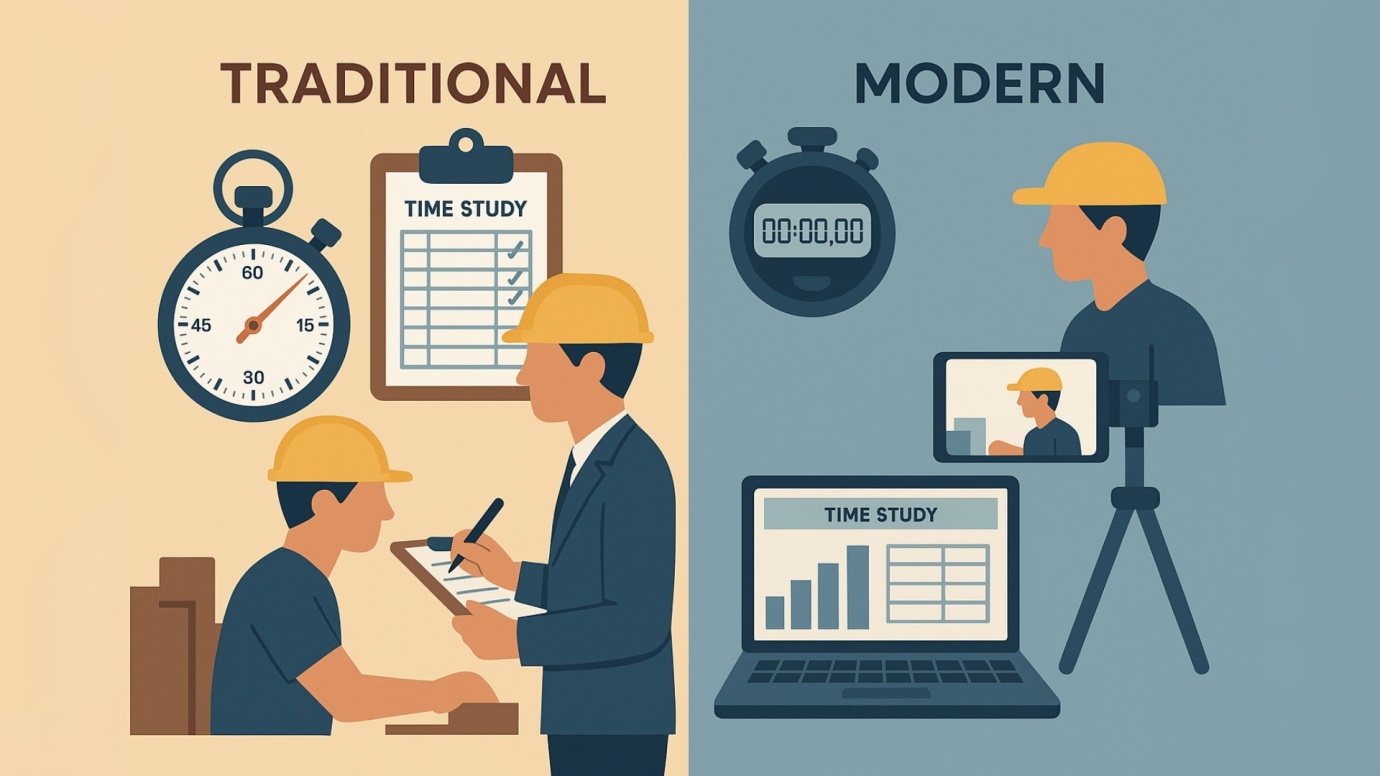
Modern Tools
With the advancement of technology, modern time study tools have made data collection faster, more reliable, and less prone to human error. These tools are now a standard in time study in industrial engineering and are widely adopted by progressive manufacturing companies.
Modern tools include:
- Video Analysis: Allows tasks to be recorded and analyzed frame-by-frame for greater accuracy. It also enables collaborative time study analysis with multiple reviewers.
- Digital Stopwatches: More precise than manual stopwatches and often integrated with data export features.
- Time Study Software: Specialized software can automate calculations, apply performance ratings, and generate standard time reports instantly. This makes modern time study processes more efficient and data-driven.
Comparison with Other Work Measurement Methods
While time study is one of the most well-known techniques, it’s important to understand how it compares to other methods in time study in industrial engineering:
- Work Sampling Method: Instead of continuous timing, random observations are taken to estimate the proportion of time spent on various activities. It’s useful for less repetitive tasks. To dive deeper into this method, check out our detailed blog on Work Sampling Method.
- Predetermined Motion Time Systems (PMTS): Systems like MTM (Methods-Time Measurement) and MOST (Maynard Operation Sequence Technique) use standard times for basic human motions rather than direct timing. This removes the need for on-site timing and can make time study analysis faster for complex tasks. Learn more about how PMTS works in our dedicated article on Predetermined Motion Time Systems (PMTS).
- MTM (Methods-Time Measurement): Breaks work into micromotions with pre-set time values, allowing detailed analysis without stopwatch timing. Explore the benefits of MTM in detail on our Methods-Time Measurement (MTM) blog.
- MOST (Maynard Operation Sequence Technique): A higher-level version of PMTS, ideal for repetitive tasks in mass production environments. Read more about its practical applications in our blog on Maynard Operation Sequence Technique (MOST).
By combining traditional and modern tools, and understanding where other methods like Work Sampling or PMTS fit in, companies can tailor their time study approach to match their unique processes. At Sugoya India, we help businesses choose the best mix of techniques for effective time study analysis and practical improvements on the shop floor.
Common Challenges and How to Overcome Them
While a time study is an incredibly valuable tool for improving productivity and efficiency, it does come with certain practical challenges. Being aware of these common hurdles — and knowing how to tackle them — can make your time study analysis much more accurate, fair, and accepted by your workforce.
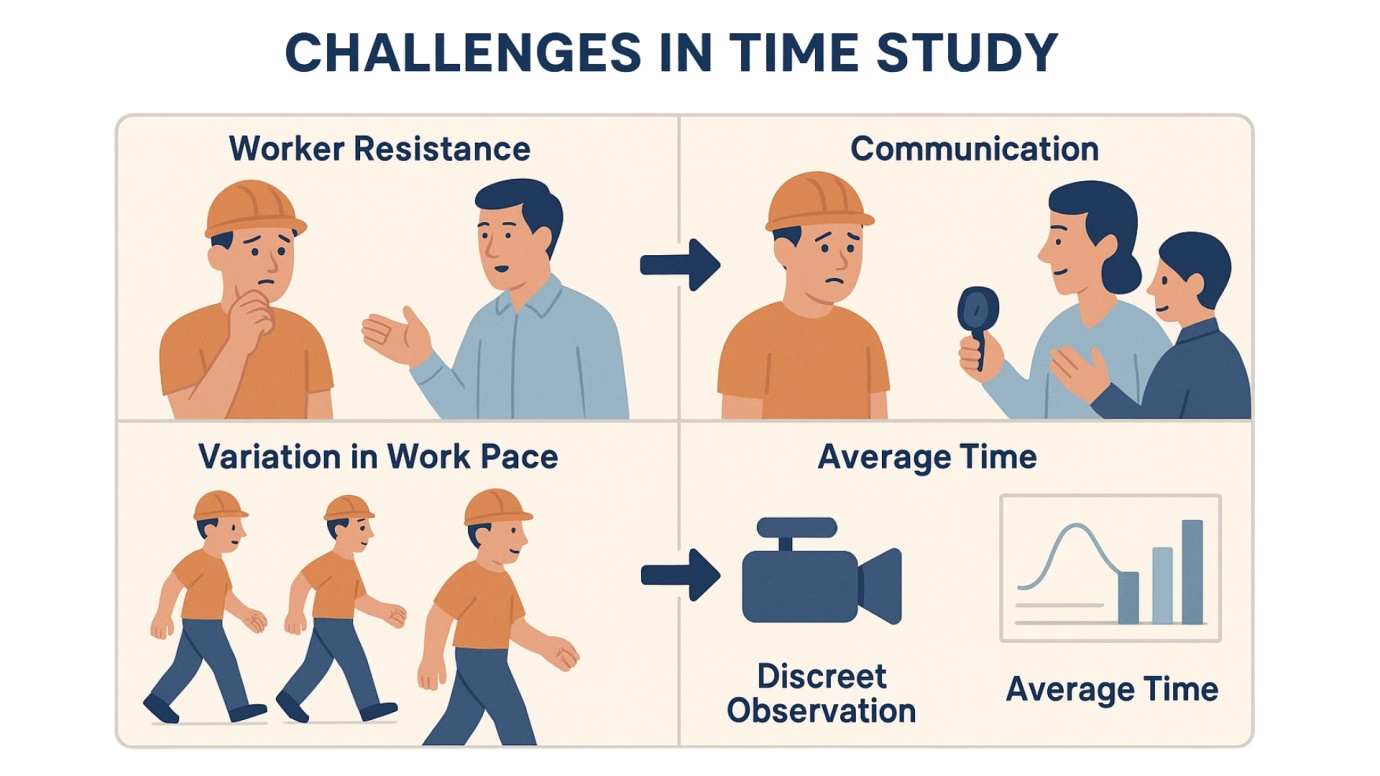
1. Worker Resistance
One of the most common obstacles in any time study is the reluctance or anxiety of workers being observed. People often feel that the purpose of a time study analysis is to rush them or reduce their breaks, which can create distrust and impact performance.
How to handle it:
- Clearly explain the goals and benefits of the time study to everyone involved.
- Emphasize that the purpose is to set realistic standards — not to overwork employees.
- Involve workers in the process by asking for their feedback and suggestions.
2. Observer Effect (Hawthorne Effect)
The Hawthorne effect occurs when workers alter their normal behavior because they know they’re being watched — a challenge that can easily distort the results of a time study analysis.
How to handle it:
- Conduct multiple observation cycles until workers become comfortable and settle into their normal work pace.
- Use discreet observation tools like video recording (with consent) to reduce the feeling of constant scrutiny.
- Make the time study process as routine as possible so that it blends naturally with daily operations.
3. Variation in Work Pace
No two workers perform exactly the same way every time. Differences in skill levels, experience, and even daily energy levels can lead to inconsistent data in your time study.
How to handle it:
- Observe multiple operators and cycles to calculate an average time.
- Use a fair performance rating system as part of your time study analysis to normalize differences in speed.
- Ensure that the observed task conditions represent normal working conditions, not peak performance.
Overcoming these challenges transforms your time study into a powerful, practical tool that drives real improvement. At Sugoya India, our experts help organizations navigate these common pitfalls to ensure every time study analysis delivers clear, actionable insights — with your team’s trust and participation every step of the way.
How Sugoya India Can Help
At Sugoya India, we understand that a well-executed time study is not just about timing tasks — it’s about transforming the way your entire operation works. Our tailored solutions are designed to help organizations across industries unlock the true potential of time study in management and time study in production management, ensuring measurable improvements in productivity, efficiency, and profitability.
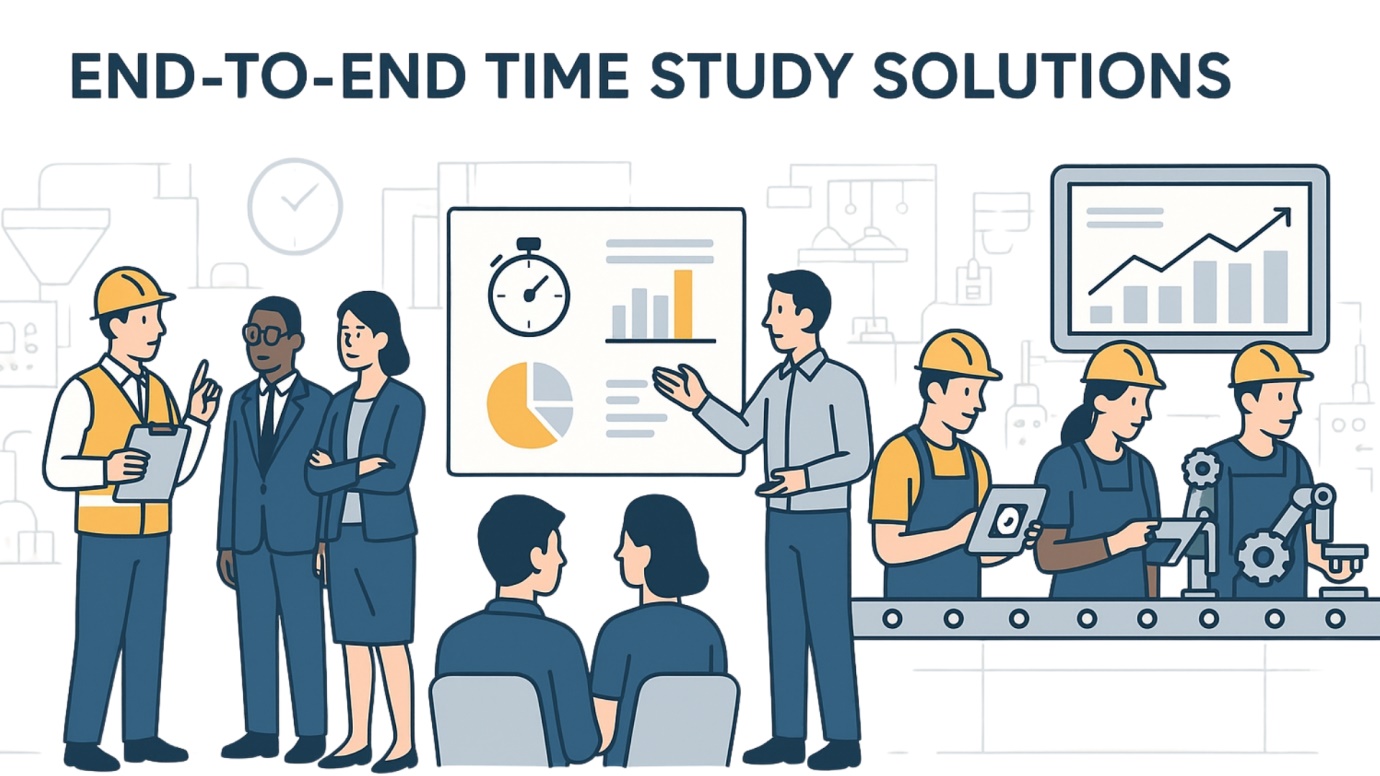
Our End-to-End Solutions
We offer a complete suite of services to make your time study journey practical, effective, and sustainable:
- Expert Consulting Services: Our team of experienced industrial engineers works closely with your managers and operators to plan and execute detailed time study in production management projects. From selecting tasks to setting fair standards, we ensure every element of your time study is handled with precision.
- Hands-On Training Programs: Empowering your workforce is key to long-term success. We conduct practical training sessions that equip your team with the skills to carry out accurate time study observations, apply performance ratings, and interpret data confidently. This builds a culture of continuous improvement rooted in effective time study in management practices.
- Technology-Driven Solutions: In today’s fast-moving manufacturing environment, we integrate the latest tools for advanced time study and data analysis. From digital stopwatches to modern video-based measurement systems, our technology ensures your time study data is precise, reliable, and easy to implement.
Why Choose Sugoya India?
- Proven Expertise in Industrial Productivity Improvement: Our team brings decades of hands-on experience in time study in management, lean manufacturing, and process optimization. We don’t just deliver reports — we work side by side with your teams to implement improvements that stick.
- Customized, Practical Approach: Every production floor is unique. We tailor each time study in production management plan to suit your specific processes, people, and productivity goals. This ensures that you see real, measurable results.
- Commitment to Continuous Improvement: A good time study is never a one-time exercise. We help you build a strong foundation so your organization can conduct regular time studies, track performance trends, and adapt to future challenges with confidence.
At Sugoya India, we don’t just measure time — we help you make the best use of it. Partner with us to discover how a data-driven time study approach can transform your operations, engage your teams, and drive lasting growth.
FAQs
A. A time study is a work measurement method used to determine the standard time required to complete a task. It is important because it helps improve productivity, balance workloads, and set fair performance standards — all key aspects of effective time study in management.
A. Time study in industrial engineering enables companies to analyze workflows in detail, identify inefficiencies, and redesign processes for better output. It supports continuous improvement and lean practices across manufacturing and production environments. To learn more about how we apply industrial engineering services to maximize efficiency and implement effective time study in industrial engineering, visit our Industrial Engineering Services page.
A. Almost every industry with repetitive tasks — from automotive to electronics to FMCG — can benefit from time studies manufacturing processes. By applying time study analysis, they can optimize operations and reduce costs.
A. A well-executed time study in production management ensures that each process is optimally planned and resourced. This minimizes downtime, balances workloads, and helps maintain consistent output.
A. Time study in management provides accurate data for setting performance standards, estimating labor costs, and planning schedules. It helps managers make fair and informed decisions.
A. The Hawthorne Effect happens when workers change their behavior because they know they’re being observed. In any time study analysis, multiple cycles and discreet observation help reduce this effect.
A. Regular time studies manufacturing processes should be reviewed when workflows change, new equipment is introduced, or productivity drops. Ongoing time management research ensures standards stay relevant.
A. A time study involves continuous timing of tasks, while work sampling uses random observations to estimate how time is spent. Both methods are valuable tools in time study in industrial engineering.
A. By setting standard times through a detailed time study analysis, businesses can calculate labor costs more accurately. This is critical for competitive pricing and profit planning.
A. Sugoya India specializes in implementing time study in production management, consulting, training, and technology solutions. We guide businesses through every step — from planning a time study to applying the findings for lasting improvement.
Conclusion
In today’s competitive industrial landscape, a well-executed time study is not just a tool — it’s a strategic advantage. By applying the principles of time study in management and time study in production management, businesses can gain clear insights into how time is truly spent on the shop floor, uncover hidden inefficiencies, and set realistic standards that drive consistent performance improvements.
A systematic time study empowers organizations to balance workloads fairly, streamline operations, and control labor costs — all while fostering a culture of transparency and trust among workers and managers alike. Whether you operate a large-scale manufacturing plant or a small production unit, adopting structured time study in production management techniques can lead to long-term gains in productivity, quality, and profitability.
At Sugoya India, we believe that investing in a robust time study approach today lays the foundation for sustained growth tomorrow. Our expert team combines deep industry experience with practical tools to help you design, implement, and benefit from effective time study in management practices that deliver measurable results.
Ready to take your operations to the next level? Let’s unlock hidden efficiencies together.
Contact us today to discover how our tailored time study solutions can transform your processes, engage your teams, and power your success.
To learn more about Sugoya India and our expert consultation services, visit our Homepage.

